- Home
- Jean Stone
Trust Fund Babies Page 6
Trust Fund Babies Read online
Page 6
“Do you love the baby’s father?” Aunt Rose asked.
Mary Beth didn’t flinch. “I don’t even know his last name.”
Aunt Rose nodded as if she understood that, too. The best part was she didn’t try to make Mary Beth feel stupid or like a whore or anything. “They’re going to make you have an abortion,” she said with certainty. “They’re going to make you have an abortion. That’s what they did to me.”
Her voice was so quiet, her demeanor so gentle, that Nikki almost missed what she’d just said. She blinked and so did Mary Beth, and both pairs of their eyes focused on their pretty aunt.
Aunt Rose?
“I was seventeen,” Rose said. “It happened here, too.” She said it matter-of-factly, as if she’d just announced it was time for lunch or time for Gabrielle to go to bed. Then she stood up. A darkness passed over her face, her Jekyll turned to Hyde. “I’ve never forgiven them and neither will you. But it’s what will happen. You will not have a choice.”
Mary Beth sniffed. “I could run away. I have my own money now. Or I could stay here if I want. This house belongs to me.”
Aunt Rose went to the bed and sat next to Mary Beth. She touched her cheek and smiled a sad smile. “If you run away they will find you. For one thing, you’re a minor. More important, you’re an Atkinson, and Atkinsons have a responsibility to the world. Or, at least, the Atkinsons think they do.” She attempted a small laugh. “It’s really quite absurd,” she said, “but make no mistake about it. Just because your grandparents are dead, things will not change. My sister Margaret is in charge, and I hate her. I hate them all because I let them get away with it.”
She stood again, and Nikki and Mary Beth kept their eyes on her.
“Don’t get me wrong,” she said, “I love your Uncle Mack and I love Gabrielle. But something will always be missing from my life, a big hole of what might have been.” She might have cried right there and then, but her voice was flat, all emotion gone, as if the pain was too great to recall. “The only good thing,” Aunt Rose then added, “is that it will be over so fast you’ll hardly remember, and they will never tell you if it was a boy or a girl.”
With that, she left the bedroom. Nikki and Mary Beth sat very still, and neither of them spoke for what seemed like a very long time.
* * *
Two days later, Mary Beth was whisked off to Puerto Rico for a proper abortion that no one—not Margaret, not Dorothy, or even Aunt Rose—ever spoke of again.
During the few days she was gone, though the sun still shone like summer, it could not break through the sullen cloud that hung over the estate. Even Gabrielle seemed to sense something was wrong, seemed to know enough to sit quietly with Barbie and not say much to anyone.
As for Nikki, she supposed she was afraid. Afraid that the same end could have happened to her. Afraid that she would not have the courage to have an abortion, and then where would she be with a Negro baby to raise? It was then that she realized even all the money in her trust fund could never have saved a baby of hers and Henry’s from shame out in the world, out far beyond the safety of Henry’s attic room. She knew that for a baby, it would not be fair.
She immersed herself in her art and began to paint a portrait of Aunt Rose, the only one of them who seemed to know what life was really like, the only one with the courage to unearth the San Andreas Fault in the Atkinson bedrock of perfection.
Mary Beth returned to the Vineyard in time for Labor Day weekend, as if nothing had happened. But something had happened, and Nikki could not let it go.
They sat by the lighthouse on that last day of summer, keeping a distance from the traditional barbecue where the Atkinsons served half the residents of Katama Bay. Though Grandfather had died, the show had to go on.
The Atkinson “girls” were, as usual, dressed in ladylike white cotton dresses, adorned with frilly lace for Dorothy, a starched collar for Margaret, and a pale blue ribbon for Rose. Thank God the next generation was not forced into compliance of either clothing or attendance.
“I was so stupid,” Mary Beth said, her knees pulled up, her hands clutching them together as if they would remain forever closed, never, ever again to part, even if Prince Charming dropped out of the sky.
“You were no more stupid than me,” Nikki said. “I’ve been making love all summer. The only difference was, you got caught.”
“But he wasn’t even right, Nikki. He was a gardener, for God’s sake.”
Nikki did not mention that Henry was the son of a minister. And of African descent. Nor did she confess that, indeed, she had stopped having sex with him when Mary Beth announced she was with child, that reality had crowded too close to her, like last year when a boy in school had a brother killed in Vietnam, and suddenly that black-and-white place on the evening news didn’t seem so far away. Nor did Nikki mention that once her good sense prevailed over what she’d thought was love, Henry, sadly, did not seem to mind. “C’est la vie,” he’d said, “n’est-ce pas?”
Nikki cleared her throat now. “Well,” she said, “maybe your mother’s right. Once you’re back in school you’ll forget this ever happened.”
Mary Beth was silent. She looked up into the sky; her gaze followed a gull. She did not have to say what Nikki already knew, that being back in school would not change a thing. She’d had an abortion. She’d ended a life that had been half-Atkinson.
Mary Beth stood up and shook sand from her sharkskin shorts, the girl who would not be caught dead in cutoffs and a peasant blouse, but who had made love not war and look where it had gotten her. “Let’s go to the party,” she said, “and pretend to have fun.”
* * *
Gabrielle wished she had a sister, someone to play with. She could have wished for another cousin, one her own age, but neither Nikki nor Mary Beth had fathers so she knew that couldn’t work. Besides, there was no guarantee that another cousin wouldn’t treat her like they did, as if she weren’t there. Mommy said to be patient, that it was just because they were so much older than she was. But Mommy didn’t really know what it felt like, because everyone loved her, except maybe Aunt Margaret, who made noisy sighs whenever she heard poor Mommy cry.
Sitting under a tree by the caretaker’s cottage, Gabrielle listened to the grown-ups laugh and talk and socialize, Aunt Dorothy called it, which meant standing and holding a drink that had an olive or a slice of lime floating in the glass.
There weren’t any kids there, of course. None of the Atkinson friends seemed to have any, or if they did, they must have kept them locked up in their cellars or in the trunk of an old Dodge like the one the caretaker drove.
You have such a vivid imagination, Mommy had said lots of times. She did not understand that making stuff up was the only way Gabrielle could feel she belonged somewhere, even if that “somewhere” did not really exist.
“Princess?”
Gabrielle looked up and saw her father. In his flowered, open-necked shirt and solid gold chain, he looked like a movie star.
“What are you doing out here?” he asked. “Why aren’t you at the barbecue?”
“I ate a hamburger. Then I got bored.”
He crouched beside her and smoothed one of her pigtails. “You’ll be glad to get home, won’t you?”
She screwed up her nose because home wasn’t much better because that meant going back to school and she’d rather stay home with Mommy. Maybe that would make Mommy feel better, if they could read books and do embroidery and play Chutes and Ladders together.
“Fireworks in less than an hour,” Daddy said, checking his watch, then standing up. “Have you seen Mommy?”
Gabrielle shook her head. The look on Daddy’s face told her he was worried again. “I’ll look upstairs,” she said, scrambling upright.
Daddy said, No, he’d already done that. Then he stretched his mouth into one of those fake smiles Gabrielle recognized and said, “She must have gone for a walk.”
“I’ll go down by the lighthouse,” Gabrielle s
uggested, though when Mommy went off, she always returned but never said where she’d been. She’d been going “off” a lot in the last few days, since Gabrielle had told her about Mary Beth and about the baby that she wasn’t really going to have, that her mother had said Gabrielle must have heard wrong because Mary Beth wasn’t married and in order to have a baby you had to have a husband. At least she didn’t say it must have been just one more thing that Gabrielle made up.
“Okay, princess,” Daddy said now. “And I’ll look in the woods. We don’t want her to miss the fireworks, do we?” He smiled again and went away from the house and the party and into the thick trees. Gabrielle watched him for a minute, then turned and headed toward the lighthouse.
It seemed ridiculous that they were going to have fireworks, what with Grandfather dead and the fog rolling in.
Right now Mary Beth only wanted to get off this damn island and get back to school, where someone other than Nikki would speak to her because they wouldn’t know what she had done. She only wanted to be where she could forget this summer ever happened and concentrate on more important things like debutante gowns and après-skiwear for Christmas break. Even if her mother didn’t want her to, she could go to Vail; she had her trust fund and God knew she could afford it.
She walked through the dunes where Mike, the gardener boy, had taken her virginity in what had not even been a memorable incident. They’d had sex three times in all, but it had only taken once, and Mary Beth had not known, would never know, if the deed had been done the first or the second or the third time that they’d done it.
As she reached the path by the lighthouse, a small figure darted past her.
Gabrielle.
The child raced from the dunes, bolting past Mary Beth as if she hadn’t seen her. Shaking her head, Mary Beth turned down toward the jetty.
It was then that she saw the long blue ribbons fluttering in the breeze. And then that she realized they were the ribbons on the white dress that belonged to Aunt Rose, and that Aunt Rose’s body was still in the dress, lying facedown, sprawled on the rocks.
6
LATE SPRING 2001
Carla had saved Tuscany for last so she could savor her mother’s dream.
“Someday we’ll go to Italy,” Theresa had said for years, the last time on her deathbed, though she hadn’t known it was her deathbed because Carla wouldn’t let the doctors tell her. Better that she keep her dreams; better that she close her eyes and envision the old country and die in peace.
“We made it, Mama,” Carla said quietly now, patting the side of her carry-on in which she’d carried-on her toiletries and a small, silver-framed picture of Theresa, too. With the photo of her mother always in Carla’s bag, “they,” indeed, had made it. They had combed the basilicas and the ruins and the small cafés of Rome; they had been awed by the Botticellis and the Titians and the Michelangelos in Florence; they had sipped wine and strolled the countryside and broken thick crusts of bread in Tuscany. Then they had visited Gabrielle.
Six days, five nights, were all her meager savings could afford without dipping into Theresa’s life insurance settlement. Yet every waking minute had been filled with wonderment, despite the sad reality that although the picture had been with her, her mother, in actuality, had not.
Looking out the window of the 747, Carla wondered if Theresa was there among the clouds, riding on the wind, smiling with her passport in her hand. Nearly thirty years ago when she’d insisted on getting passports so they’d “be ready,” Carla had laughed. Later, when Carla’s sons were older, they’d laughed, too. Donnie, the younger one, the comedian, had reminded her that taking the subway across the Bronx to Sunday mass was enough of a challenge for one family and one world. But when Mama moved in with Carla and the boys, she would not give up the church in the neighborhood where her kids were born and raised and had gone to parochial school and where her Sal had been buried.
They had not needed passports for the Bronx. But how could Carla or her mother have predicted that having the vital folder and renewing it each decade would enable her to complete one final task for Lester Markham?
They knew now, all three of the heiress cousins.
Mary Beth had yelled, “Get off my property,” though Carla didn’t believe the lobby of an apartment building constituted “her property.”
Nikki had frowned and slowly nodded as if she were not surprised.
Gabrielle had cried.
With a small sigh, Carla reclined her seat and scolded herself for the secret pleasure she had felt when she’d learned that the women she’d once envied no longer had it all. They were women, after all, not much different from her, except for the money part. Even Mary Beth, for all her high heels and her makeup, had a mother who was sick, and Carla knew what that felt like.
Envy is a deadly sin.
Carla had learned her catechism, but sometimes she forgot. She’d have to go to confession as soon as she got home. Then, maybe, she thought as she closed her eyes, this would all be over and Lester would be waiting for her.
The roll of the jet engines lulled her into dreamy sleep and sweet reminiscences of Florence and of Rome and of how much Mama would have loved the trip.
Nikki wanted to go to the police.
“Over my dead body,” Mary Beth had yelled into the phone and meant it. There was no way anyone was going to the cops and risk the story of their family situation leaking to the media mere weeks before her daughter’s wedding. “Besides,” she’d added, “for all we know it’s a mistake. Or one of Lester’s unamusing practical jokes.”
As many years as Mary Beth had known Lester Markham, she had not known him to be a jokester, but Nikki would not know that, sequestered as she was out there on the island.
“Give me a week,” she’d pleaded with her cousin, “and I’ll have it straightened out.”
Nikki had grumbled something about AIDS being more important than a wedding, but she’d backed off when Mary Beth subtly reminded her that the wedding was for Shauna and that Dee was the maid of honor—their daughters—and she was only asking for a week, not half a freaking century.
In the end, Nikki had acquiesced, which was why Mary Beth now stood before her mirror one week later, adjusting the clasp on the black pearls and diamonds that everyone at the gallery opening would expect her to wear tonight. The baubles had been Eric’s gift for her forty-second birthday, though she’d picked them out herself and simply had the bill sent to the apartment in his name. Even if they all suspected that the money for the glittering ensemble had come from her trust fund, no one would mention it, not even Roxanne, because no one did that sort of thing and remained on the A-list in New York.
The jewels were perfect with her pewter satin slip dress, perfect for Galerie Renard, perfect for the all-in-good-fun confrontation she expected when she saw Lester Markham, who would undoubtedly be present, because Lester never missed an opportunity to have his picture in W or Town & Country.
She could have called Lester’s office to confirm the absurdity of that woman Carla’s visit and her ridiculous message. But Mary Beth had not wanted to embarrass either herself or the man to whom her fortune—her life—had been so carefully entrusted. Besides, she’d phoned Lester’s office too often in the past year. The cost of clothes and airfare and entertaining had simply escalated, and somehow she’d found that even her ends were not quite meeting. And she hated begging for advance payments on something that was rightfully hers. “Have you thought about a budget?” he’d asked once or twice, which, of course, was ludicrous. How was she supposed to know how many clothes she’d need for Greece, or that she couldn’t get bubble wands engraved unless they came from Tiffany’s?
For the hundredth time that week, she tried to recall if the voice that always answered Lester’s phone sounded like that of the woman who had showed up in the lobby.
Leaning closer to the mirror, Mary Beth reassured herself that the woman was probably a disgruntled employee, someone Lester had fired and
who was on a quest for revenge. Not that Mary Beth hadn’t been startled for a moment. But so far, the world had not stopped turning, nor had Mary Beth’s creditors stopped her from buying. Or ordering. Or anything.
Nor had any other threatening visitors arrived at the apartment, the twelve-room, five-bedroom, six-bath apartment that had once been in Dorothy Atkinson’s name but had been transferred to her daughter just before the downward slide of Dorothy’s mind.
She screwed on the earring backs and wondered if she should have called Lester after all. But why? Lester had been with the family for so long, he was practically one of them. Cheat them? Steal from them? Disappear? No, “family” did not do such things. At least, not to one another.
“Ready, darling?”
Her husband’s reflection moved into the vanity mirror. He had the clean, trim look of a male GQ model, despite the fact that he would be forty-five in the fall. She stood and smoothed her dress. “Do I look positively divine?”
He took her shoulders and kissed her cheek. “Enchanting. Yes. Divine.”
He withdrew his hands and she shivered. “Your fingers are freezing.” Layered within his usual wood-musk aroma, the strong scent of gin said the chill was not from the cool evening, but from stirring martinis in the Orrefors pitcher.
Eric stepped away. He checked himself in the mirror. “The Clarkes will be here any minute,” he said. “And the Ruddeforths.”
Mary Beth hadn’t seen either couple since the holiday balls that had cost a pretty penny to attend in the name of charity. The Clarkes (with an “e”) and the Ruddeforths wintered at ski resorts; Mary Beth preferred warm climates, like the Greek Isles. Besides, they were Eric’s friends, not hers, a group of nouveaux riches whom he’d met on a plane from Houston, where he’d dabbled with another coin collector who’d acquired an Aztec something-or-other. The fact that the Clarkes and the Ruddeforths had been “bumped” to First Class should have been a clue, but, to Eric, anyone ready for a party was a new friend in his book, and, as Roxanne was known to say, nouveau was better than never. Mary Beth sighed and adjusted her bracelet. “Your friends will be treated to the debut of my birthday gifts.”

 A Vineyard Morning
A Vineyard Morning A Vineyard Summer
A Vineyard Summer A Vineyard Crossing
A Vineyard Crossing A Vineyard Christmas
A Vineyard Christmas Beach Roses
Beach Roses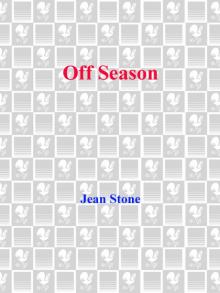 Off Season
Off Season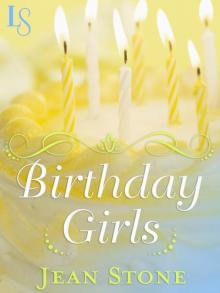 Birthday Girls
Birthday Girls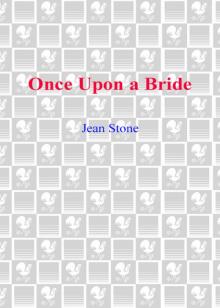 Once Upon a Bride
Once Upon a Bride Places by the Sea
Places by the Sea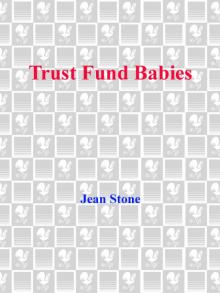 Trust Fund Babies
Trust Fund Babies The Summer House
The Summer House Tides of the Heart
Tides of the Heart Sins of Innocence
Sins of Innocence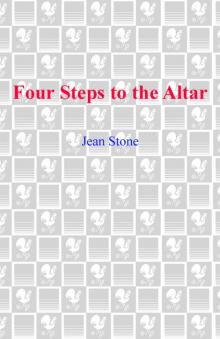 Four Steps to the Altar
Four Steps to the Altar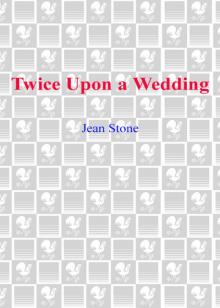 Twice Upon a Wedding
Twice Upon a Wedding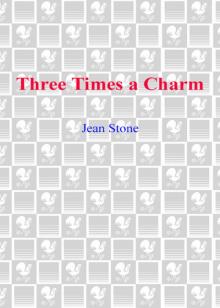 Three Times a Charm
Three Times a Charm